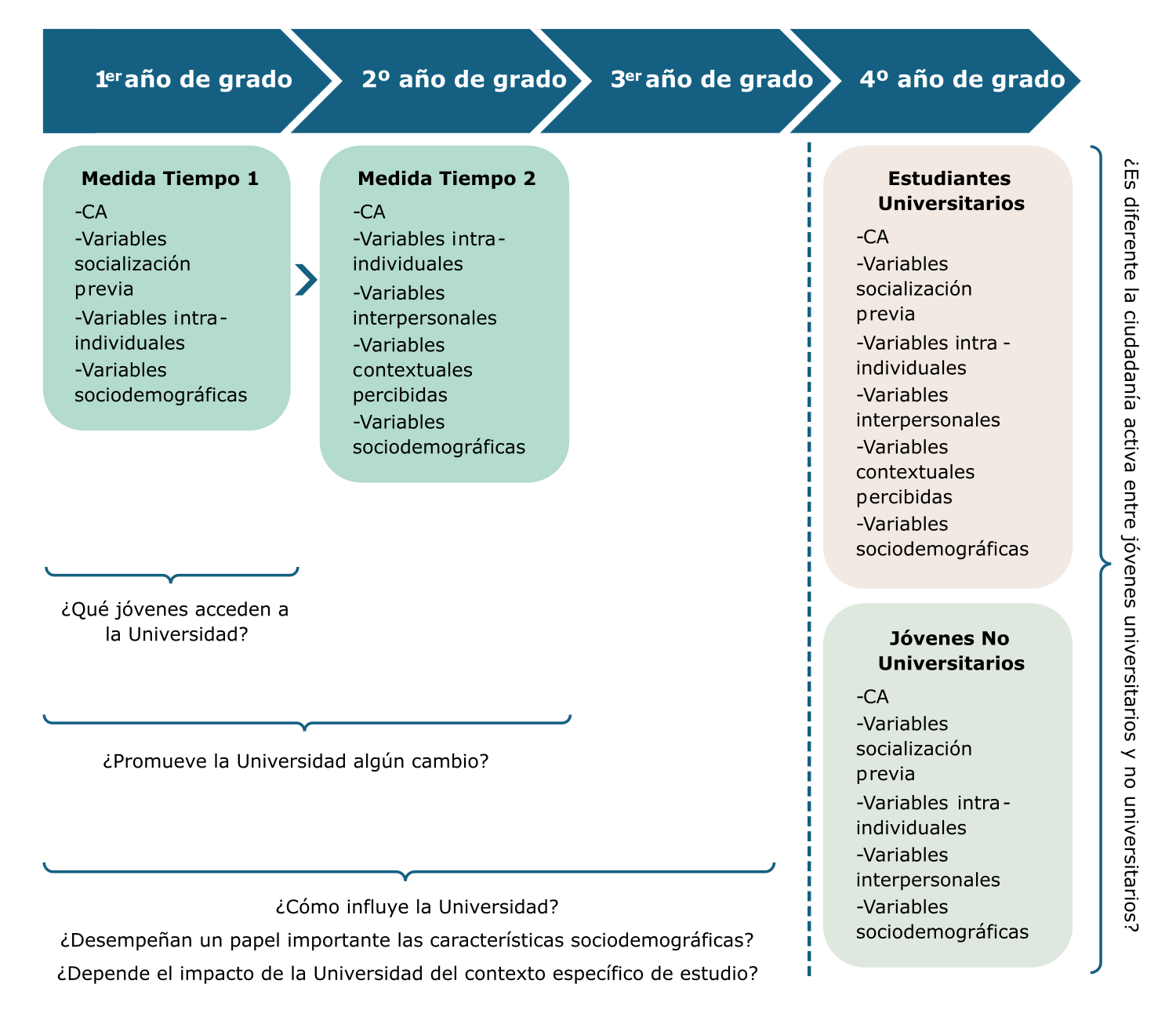Current project
Analysis of the role of the University in promoting active citizenship of students.
Project funded by the Ministry of Science and Innovation (2022). Reference: PID2022-141751OB-I00.
This project is based on the concept of active citizenship (hereafter AC). The concept is interdisciplinary and is defined as participation in social, political or community life, characterized by mutual respect and non-violence, in accordance with human rights and democracy (Hoskins and Mascherini, 2009).
Developing young people's CA is essential to favor their involvement in democratic processes (European Commission, 2007), promote personal and collective well-being, empower them and foster a sense of citizenship (Cicognani et al., 2015). Moreover, youth is a critical period for developing patterns of participation that are sustained throughout life (Greenfield and Moorman, 2018).
The university has exceptional potential as an environment conducive to fostering young people's CA. In this context, it provides opportunities to debate and analyze social reality, in addition to fostering the development of participatory skills (Peterson and Knowles, 2009; Zukin et al., 2006). However, despite its relevance, there are limitations in the studies that comprehensively address the role of the university in this area (Yand and Hoskins, 2020), which is even more evident in the European Union and, specifically, in Spain. The purpose of this project is precisely to address this gap. With a student-centered approach, it aims to analyze the role of the university in promoting its CA and to propose specific recommendations to boost it from this educational institution.
The project involves the participation of four leading Spanish universities: the Complutense University of Madrid, the Autonomous University of Madrid, the University of Malaga and the University of the Basque Country. With a planned duration of three years, it is structured around three studies that combine quantitative and qualitative methodologies. Each of these studies is represented visually in the figure below, where a color system is used to distinguish between them. In all cases, the participants are young people, both university and non-university students, whose subjective perception constitutes a fundamental element of the research.
STUDY 1 focuses on young university students who have just started their studies and who will be contacted again during the second year to carry out a follow-up to analyze potential changes.
STUDY 2 focuses on young people who are about to finish their university studies.
STUDY 3 focuses on non-university youth with a socioeconomic profile similar to that of the youth participating in STUDY 2.
Currently, the first measure of STUDY 1 has been carried out.
If you want to know more or want to participate in any way through your university or as a collaborating university, please contact us.

References
Hoskins, B. L. y Mascherini, M. (2009). Measuring active citizenship through the development of a composite indicator. Social indicators research, 90(3), 459-488.
European Commission. (2007). European Commission Staff Working Document: Progress Towards the Lisbon Objectives in Education and Training indicators and benchmarks. Luxembourg: Office for the Official Publications of the European Communities.
Cicognani, E., Mazzoni, D., Albanesi, C., y Zani, B. (2015). Sense of community and empowerment among young people: Understanding pathways from civic participation to social well-being. VOLUNTAS: International Journal of Voluntary and Nonprofit Organizations, 26(1), 24-44.
Greenfield, E. A. y Moorman, S. M. (2018). Extracurricular involvement in high school and later-life participation in voluntary associations. The Journals of Gerontology: Series B, 73(3), 482-491.
Peterson, A. y Knowles, C. (2009). Active citizenship: A preliminary study into student teacher understandings. Educational Research, 51(1), 39-59.
Zukin, C., Keeter, S., Andolina, M., Jenkins, K., y Carpini, M. X. D. (2006). A new engagement?: Political participation, civic life, and the changing American citizen. Oxford University Press.
Yang, J. y Hoskins, B. (2020). Does university have an effect on young people’s active citizenship in England?. Higher Education, 80(5), 839-856.
